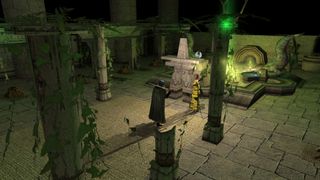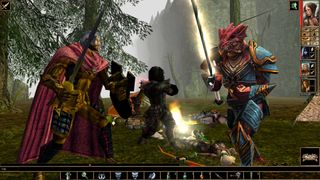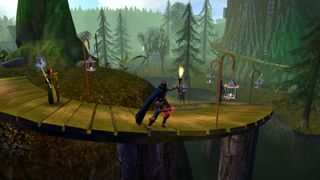This fantasy author can't stop making mods for the 21-year-old D&D videogame that first disappointed him, and then 'helped shape' his life
Like many, Luke Scull didn't gel with Neverwinter Nights' official campaign. Now he's working on a 60+ hour unofficial sequel.

Luke Scull, author of The Grim Company series of fantasy novels and a developer at RPG studio Ossian, did not initially have a high opinion of the game that would change his life: he excitedly purchased what fans expected to be the successor to BioWare's seminal Baldur's Gate series, then found himself devoting his summer to Warcraft 3 instead of the game he thought he'd be "falling in love with." Today, however, he credits Neverwinter Nights as the catalyst for his writing career, and is still creating custom modules for it more than 20 years later.
The main campaign of BioWare's follow-up to Baldur's Gate has a mixed reputation even among diehard fans—it's not "the greatest example of what can be achieved" with Neverwinter Nights' toolset, Scull thinks. The campaign was simultaneously rigid and never ending—after a strong first act, you're just chopping through a ceaseless slog of content, and none of it all that interesting or all that open-ended for role playing.
Before BioWare managed to return to form with NwN's more dynamic and inventive expansions, the game had already been saved by its modding community. Thanks to a robust, yet beginner-friendly toolset, modders like Scull began producing new, exciting adventures or "modules" (borrowing the term from tabletop) with BioWare's engine. Something radically changed for Scull when he first started playing with the Aurora Toolset. "That lit something inside of me," he said, "some kind of creative bug that I'd always had."
Atari were dicks, basically."
Luke Scull
Scull's initial contribution was the module Siege of Shadowdale in 2002, a low-level adventure set in the adopted home of Elminster, the Forgotten Realms' resident superwizard and the protagonist of like, a dozen books by Realms creator Ed Greenwood (he also gets a cheeky cameo in the D&D movie that greatly appeased dorks like me). Scull followed it up in 2005 with Crimson Tides of Tethyr, a mid-level adventure set amid a brewing conflict in the titular kingdom.
Both have a kind of character and momentum that's missing from the original NwN campaign. Siege is like a perfect videogame homage to a low-level tabletop D&D module, and reminds me a lot of Troika's criminally underappreciated Temple of Elemental Evil—it's slightly bounded, but provides a micro-open world to explore, letting you shove off in any direction from the titular starting town for some light hearted adventuring before gradually uncovering the high-stakes conspiracy at the heart of its main quest. Tethyr, meanwhile, is more cinematic and high-energy, featuring interesting experiments with the Aurora Engine like an early boss who teleports between loading zones.
"It's almost overnight I went from being an amateur writer, to kind of having figured out how to write," Scull said. "I don't know how it happened. But I then had BioWare contact me in 2006 to ask me to do a premium mod for them. And I of course said yes, because why wouldn't you?"

"Even though the pay was terrible for the amount of work," Scull added. "Creating this 20 hour module was like 200,000 rows of dialogue. It's basically a large fantasy novel: 'Script it all, program it all, design the areas, and we'll pay like 5,000 Canadian dollars.'"
The biggest gaming news, reviews and hardware deals
Keep up to date with the most important stories and the best deals, as picked by the PC Gamer team.
Unfortunately, Neverwinter Nights publisher Atari abruptly shut down the premium module program before Tyrants of the Moonsea could be finished, a move Scull describes as the publisher being "dicks, basically." Scull eventually finished the adventure as best he could before releasing it on the Neverwinter Vault for free, completing a trilogy of sorts with Tethyr and Shadowdale.
It's helped shape my life; it's helped shape my writing career."
Luke Scull
Scull wound up having another go at Neverwinter Nights under Atari's auspices though, beginning a long tenure with Ossian, a small studio founded by ex-BioWare producer Alan Miranda. Scull was lead designer on Neverwinter Nights 2: Mysteries of Westgate. Neverwinter Nights 2's final expansion was released in 2009, though not without further trouble from Atari: an early and draconian form of DRM left the game difficult to play even with a legitimate copy, though like many CRPGs, it found a long tail through distribution on GOG.
Staying Power

Despite the general lack of commercial prospects in hardcore fantasy games, let alone the fanmade-to-official bonus content for them, Scull's first Neverwinter Nights modules ultimately led to a career in games and fantasy fiction. "I was working part time in an office to support myself while working on The Shadow Sun [a mobile RPG from Ossian] and got laid off, so I decided 'why not try writing a novel?'"
That project would become the first of Scull's Grim Company books, a dark fantasy series where rag tag, misfit adventurers are thrust into history-shaping events in a brutal world. Today he's an established author, recently having contributed to the Warhammer setting for Games Workshop while continuing to build The Grim Company's world and develop games for Ossian.
He attributes that success to the creative outlet he had in Neverwinter Nights module-building. "It's helped shape my life; it's helped shape my writing career," Scull told me. "In fact, the advance for Mysteries of Westgate paid for my wedding way back in 2007. I would have had a very different career and been a very different person if I had never picked up that box with the giant glowing eye."
And he's never really stopped coming back to Neverwinter Nights. In 2019, Ossian returned to Tyrants of the Moonsea, adding new quests as well as graphical enhancements and bespoke art, producing a remastered module to go with Beamdog's Neverwinter Nights Enhanced Edition and finally fulfilling the "Premium Module" promise that got cut off in '06. Solo, Scull released a similar treatment for Siege of Shadowdale, and is working on another for Crimson Tides of Tethyr.
It's something I want to do for fun because I have always enjoyed modding. It makes me happy."
Luke Scull
Scull has at least one last great project left on the Aurora engine as well: The Blades of Netheril, a multipart, unofficial sequel to the original Neverwinter Nights campaign. I was really curious why Scull chose the OG, Wailing Death campaign to continue—after all, didn't we all think it was kind of a let-down? "The original campaign," Scull explained, "has some fantastic characters," ones he wanted to return to. I have to agree—despite its foibles, the Wailing Death campaign did have some real memorable personalities like a disillusioned, brokenhearted paladin, a patriotic spymaster, and my favorite: a dwarven pugilist-assassin obsessed with death and the end of all things.

With BioWare tied up in protracted development for its far more recent, megahit in-house franchises like Dragon Age and Mass Effect, who else but NwN's passionate module builders to continue the story of this awkward middle child between Baldur's Gate and Knights of the Old Republic? Scull also believes that the open-ended, bittersweet conclusion of the original game leaves it primed for an experiment with "an antihero player character, one that had once attained great heights, and then had a fall from grace."
Scull wants to do it right, crafting a multipart, high level adventure continuing with, ideally, an imported character who finished the original campaign (though high-level modules often let you bring a lowbie up to speed). To that end, he's funding the project through Patreon and commissioning art, music, and contributions from other module builders. Scull plans on having the first episode of a planned seven, Doom of Icewind Dale, out later this year, with the second chapter focusing on the Forgotten Realms' underground pirate city of Skullport.
"It's something I want to do for fun because I have always enjoyed modding. It makes me happy," Scull explained. "I love the Forgotten Realms. It's just a long-held desire I've had to complete the saga that began with Siege of Shadowdale, and also finish the story of the Hero of Neverwinter, who just disappears at the end of the Wailing Death campaign."
On his introduction to The Blades of Netheril on Patreon, Scull calls the project "a love letter to NwN," and the author estimates that he'll be busy cranking out those seven chapters until at least 2027, a full quarter century after Neverwinter Nights' initial release—a pretty good run for a strange little RPG that started with only a hit-or-miss campaign.
Ted has been thinking about PC games and bothering anyone who would listen with his thoughts on them ever since he booted up his sister's copy of Neverwinter Nights on the family computer. He is obsessed with all things CRPG and CRPG-adjacent, but has also covered esports, modding, and rare game collecting. When he's not playing or writing about games, you can find Ted lifting weights on his back porch.
Most Popular


